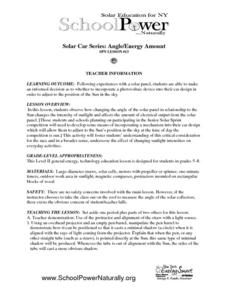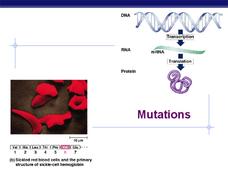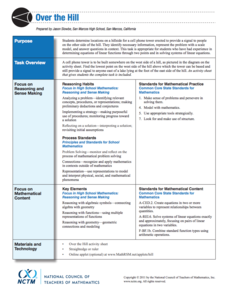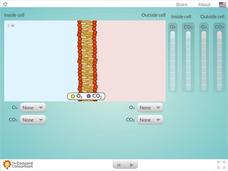Howard Hughes Medical Institute
Mendelian Genetics, Probability, Pedigree, and Chi-Square Statistics
People with the sickle cell trait, but not sickle cell disease, find natural protection against malaria. Scholars consider various combinations of genotypes and environmental factors to determine if children might have sickle cell...
Curated OER
The Good and Bad Bacteria
Students are able to name one kind of harmful bacteria and why it hurts us and also name one kind of helpful bacteria and how we use it. They describe the process of growing bacterial cultures in a lab. Students create a reasonable...
Curated OER
Solar Car Series: Angle/Energy Amount
Does the angle of a solar panel change the output? Emerging engineers find out! Demonstrate for your class how they can angle a straw to match the angle of light rays coming from a source. Then turn them loose to experiment with the...
Curated OER
DNA, the Awesome Thread of Life
Students examine how traits are passed to offspring. In this genetic reproduction lesson students develop a model of dna and learn about its structure, replication and function.
Curated OER
Mutations
The basics of mutation types and some potential effects of those are described and diagrammed here. Each detail is very clear and includes the labels and translation change exhibited. A great slideshow to expand on DNA replication issues.
Concord Consortium
Aquapores
Aquapores allow water to travel through cell membranes while keeping other molecules out. The animation offers an up-close look at these parts of the cell membrane. It explores multiple vantage points and shows the importance of these...
Howard Hughes Medical Institute
The p53 Gene and Cancer
Is understanding the p53 gene the key to kicking cancer? Introduce a most-important protein through a presentation with colorful diagrams, simulations, and brief lectures. Viewers discover how p53 works, the cellular processes it...
Bonneville
Variables Affecting Solar Power
Determine the best energy generator. Groups play with a photovoltaic cell to determine the variables that affect its energy output. The teams investigate a variable to determine the optimum performance of the solar cell. Pupils compare...
Bonneville
Construction Progress and Obstacles
Overcoming obstacles is how one grows. In groups, scholars discuss their progress in constructing their solar cells and talk about any obstacles they may be encountering. They first work in heterogeneous groups to see different types of...
Exploratorium
Cellular Soap Opera - Soap Films Can Behave Like Membranes
Soap, suds, and cell membranes. Pupils create a model of a cell membrane by using soap films. They experiment with trying to pass different objects through the film without popping it. Using a tube, they create a passageway through the...
Curated OER
Science Jeopardy
Wow! Review an entire semester of biology curriculum playing this Science Jeopardy game! The variety of topics is extremely broad, so you will need to review each question to find if they all apply to your course. As you find material...
National Council of Teachers of Mathematics
Over the Hill
Can you hear me from there? Pupils determine the place to build a cell tower on a hill. The class uses constraints and creates a scale drawing on a coordinate system to calculate the exact location of the base of the cell tower.
Utah Education Network (UEN)
Utah Open Textbook: 7th Grade Science
Physical and biological factors affect everyday living. Scholars explore electromagnetic forces, motion, the rock cycle, and geological changes. They examine cells as the building blocks of life and how organisms reproduce using images...
Bonneville
Introduction to the Photovoltaic Effect
Let a video light the way to a better understanding of solar energy. Scholars first learn vocabulary terms related to the photovoltaic effect, solar cells, and electricity. They then watch a video to learn why silicon is often used as a...
Bonneville
Simple Solar Tracker
Let the solar cells fight each other for supremacy! Given a functional solar tracker that moves toward light, groups copy the design to build their own devices. They use two sets of solar cells that have reverse polarization, so that the...
Exploratorium
Penny Battery
Use pennies to light an LED. Class members follow the provided directions to build a multi-celled battery powered by pennies. Using stacks of pennies of varying heights, pupils control the voltage of the battery to light...
Concord Consortium
Diffusion Across a Permeable Membrane
Oxygen and carbon dioxide freely cross cell membranes. The simulation demonstrates the diffusion of these across a permeable membrane. To create a great visual for users, it graphs the balance of molecules as it changes throughout the...
Nuffield Foundation
Making Up Nutrient Agars
A resource rich in information—and nutrients. Learners create agars for the purpose of cell cultivation in Petri dishes. The lesson provides instructions on how to create agars for the cultivation of different microorganisms.
College Board
2018 AP® Biology Free-Response Questions
The average AP Biology score dropped in 2018 with the addition of more data tables and graphs. Offer additional practice free-response questions by using the questions from the 2018 AP exam covering phylogenetic trees, cell structure and...
Children’s Hospital of Philadelphia
The Adaptive Immune System
Attack the pathogen from within. Learners delve deeper into the immune system and find out about the adaptive immune system such as T and B cells. Groups create graphical models of the adaptive immune system along with a multimedia...
Bonneville
Three Ways to Generate Electricity
Get your hands on electricity. Pupils investigate magnetic fields and make the connection to generators in the fourth lesson in a series of six lessons on wind versus solar energy. Learners use a small electric motor as a generator to...
Bonneville
Solar Energy Equity and Sustainability
Generate some knowledge about generating electricity. Pupils first read several articles to learn about solar energy, its advantages and disadvantages, and advancements in technology related to solar cells. They then have a class...
Bonneville
Solar Panel Data Sharing
It's important to share—especially in science. Pupils share the data on voltage, current, and resistance they recorded when they built circuits with solar cells in a previous lesson plan. They discuss the results with the class and...
Bonneville
Background Research on Alternative Transportation Vehicles
There's no alternative to a great research project. The second of five lessons in the Solar Transportation unit has scholars research different types of alternative vehicles. They determine the price, range, battery size, and cost to...
Other popular searches
- Animal Cells
- Plant and Animal Cells
- Plant Cells
- Stem Cells
- Eukaryotic Cells
- Blood Cells
- Cells Crossword
- Cells and Organelles
- Cheek Cells
- Life Science on Cells
- Microscope Cheek Cells
- 3d Animal Cell























